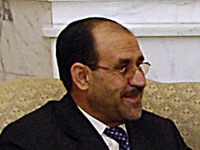Sunni Cabinet ministers are not going yet to return to their jobs
The Sunni Cabinet ministers who pulled out of Prime Minister Nouri al-Maliki's government are not ready to return to their jobs.

The comments by Tarek al-Hashemi, released by his office, appeared designed to quash suggestions that some of the ministers who quit no longer supported the decision to pull out of the government and were planning to return.
Six Sunni Arab ministers quit al-Maliki's 16-month-old government in early August over his failure to meet their demands.
One of the six, Planning Minister Ali Baban, returned to his post last week. He was expelled by his Iraqi Accordance Front but accompanied al-Maliki to New York for the U.N. General Assembly session.
Sunni Arab participation in al-Maliki's government is crucial to its credibility and the prospect of achieving national reconciliation, a key political benchmark set by the United States to gauge the performance of Baghdad's Shiite-led administration.
Without Sunni participation, al-Maliki's administration would permanently loose its claim to being a "national unity government", becoming a Shiite-Kurdish coalition that falls short of the wider political inclusion the United States has been calling for.
The Sunni demands include the release of security detainees not charged with specific crimes, disbanding militias and allowing the participation of all coalition partners in government decisions on security matters.
The ministers belong to the Iraqi Accordance Front, a three-party alliance that has 44 of parliament's 275 seats. It's made up of the moderate Iraqi Islamic Party led by a al-Hashemi, the hardline Congress of the People of Iraq led by Adnan al-Dulaimi and the National Dialogue Council headed by Sheik Khalaf al-Ilyan.
"The time has not yet come for the ministers of the Iraqi Accordance Front to return to the government of Prime Minister Nouri al-Maliki," al-Hashemi said in the statement.
In New York on Sunday, al-Maliki repeated in an interview with The Associated Press that the Cabinet posts previously held by the Front could not be left indefinitely vacant and that he would have to fill them in the near future.
Al-Maliki's office said in a statement late Thursday that a Front delegation met the prime minister before he left for New York. Al-Maliki agreed to set up a committee to look into the demands made by the Sunni Arab bloc, according to the statement.
Lawmakers from the Front, however, disputed that claim.
They said Salam al-Zobaie, who served as deputy prime minister before he quit the government, was acting in his personal capacity when he met with al-Maliki.
They also accused al-Maliki of trying to drive a wedge between the Front's partners with the aim of luring some of the ministers back without the bloc's approval.
"The government is exploiting informal meetings for media purposes," said Sunni Arab lawmaker Omar Abdul-Sattar. "The Front's position is clear, solid and definitive and the ball is in the court of the government. Meeting our demands doesn't need a committee."
A close aide to al-Maliki, speaking on condition of anonymity because of the sensitivity of the negotiations, said the Sunni Arab bloc was expected to rejoin the government but was waiting for the prime minister to meet some of its demands so the Sunni Arabs don't loose their credibility.
Al-Maliki's squabble with the Sunni Arabs is just one of his problems.
Six ministers loyal to radical Shiite cleric Muqtada al-Sadr quit the government in April in protest against the prime minister's failure to announce a timetable for the withdrawal of U.S. troops.
Former Prime Minister Ayad Allawi is also leading a campaign for al-Maliki's ouster. However, the prospect of al-Maliki loosing a vote of confidence in parliament appears uncertain.
Subscribe to Pravda.Ru Telegram channel, Facebook, RSS!


